Updates on activities of Dr. Brian Greenwood (The Laureate of the First Hideyo Noguchi Africa Prize for Medical Research)2019
Please see also the updates of 2015:Newsletter No.11 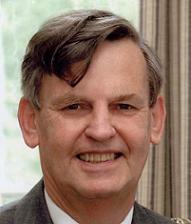
Updates on activities
1. Research
1-1 Malaria
There has been excellent progress in the control of malaria with a reduction in deaths by about a half since 2000. However, nearly half a million people still die from malaria each year, mostly young children in Africa especially in countries of the Sahel and sub-Sahel where malaria transmission is concentrated in just a few months of the year. During the past decade, I and colleagues at the London School of Hygiene & Tropical Medicine (LSHTM) have worked with partners in Africa to develop the control measure called Seasonal Malaria Chemoprevention (SMC) which involves giving an anti-malarial drug combination to all children under five years of age (the group most at risk) on four occasions at monthly intervals during the period of peak malaria transmission. Trials have shown that SMC is highly effective in preventing malaria and the intervention is now being rolled out across many countries, with approximately 20 million children expected to receive SMC in 2019.
In 2009, it was reported that mass drug administration (MDA) with azithromycin for the control of trachoma in Ethiopia led to a substantial reduction in overall child mortality, which was difficult to explain. A subsequent, much larger multicentre trial (the MORDOR trial), confirmed this effect although it was much less marked (a 13.5% reduction in overall child mortality). Based on the dramatic findings of the initial study in Ethiopia we wondered whether we could achieve a similar effect by adding azithromycin to the antimalarials used for SMC and in 2014 initiated a large trial with colleagues in Burkina Faso and Mali, with support from the UK MRC Joint Global Health Trials Programme, to test this hypothesis. Approximately 20,000 children aged 3 - 59 months received SMC with antimalarials together with azithromycin or a placebo. The children were followed for three years and all deaths, hospital admissions and attendances at clinics were recorded. Azithromycin reduced clinic attendances with respiratory or gastrointestinal infections, non-malaria fevers and skin infections by about 20% but, in contrast to the MORDOR trial, azithromycin did not have any impact on deaths or hospital admissions (Chandramohan et al. New England Journal of Medicine 2019; 380:2197-2206). This important finding has been used in evidence by a WHO Policy Committee considering how best azithromycin might be used as a child survival strategy in countries of Africa with high child mortality. Our findings suggest that in countries where SMC is being deployed it would not have an impact on child survival
Despite the addition of SMC to the other tools used for malaria control, mortality and morbidity from malaria remains high in countries of the African Sahel and sub-Sahel including Burkina Faso and Mali. Therefore, following on from the disappointing results from the azithromycin study, we considered whether there are any other interventions that could be deployed to complement SMC. One potential option is the partially effective malaria vaccine RTS,S/AS01, which is being deployed in large pilot trials in three countries in Africa. This vaccine provides a high level of efficacy for a few months but this then wanes rapidly. Thus, we wondered whether it might be possible to make use of these characteristics of the vaccine by using it as a seasonal vaccine given just prior to the malaria transmission each year, in a manner similar to the way in which influenza vaccines are used in countries with a temperate climate. Thus, in 2017 we commenced a trial in 6000 young children resident in the same areas in Burkina Faso and Mali where the azithromycin study was done to see if this vaccine could be used to replace SMC and/or whether it would provide added value if given together with SMC. So far over 5,500 young children have received their priming doses of malaria or control vaccine and one booster dose. A second booster dose will be given in June 2019. Initial results from this trial will be available in mid-2019 and a decision made then as to whether to continue with seasonal vaccination until the study children reach the age of five years.
1-2 Ebola
In 2014, Guinea, Liberia and Sierra Leone were affected by the worst ever epidemic of Ebola. In November 2014, I travelled to Sierra Leone with Professor Piot, Director of LSHTM and Hideyo Noguchi prize winner, and Professor Jeremy Farrar, Director of the Wellcome Trust, to review the situation in Sierra Leone and consider what LSHTM could do to help. Following discussions with senior staff at Johnson and Johnson, it was agreed that LSHTM would lead a study of the company’s prime boost Ebola vaccine in Sierra Leone. Having worked previously in Sierra Leone, I was asked by Prof Piot to help in setting up the trial in Sierra Leone in collaboration with the College of Medicine and Allied Health Sciences (COMAHS) at the University of Sierra Leone. The trial has been supported by the European Union’s Innovative Medicines Initiative (IMI). Kambia district, bordering on Guinea, was chosen as the best site for the trial as the epidemic was still continuing in that district. Kambia had no resources to support a trial, for example no electricity, and the doctor in charge of the local hospital had sadly died from Ebola. Thus, the project team (EBOVAC), in the face of an on-going epidemic, had to start from scratch establishing vaccination clinics in rented houses, a high quality laboratory in shipping containers and training a team with no previous clinical trials experience on how to conduct a clinical trial to the standard that would support registration of the vaccine by the FDA. It was planned initially that an efficacy trial would be done, but by the time that the centre was ready to start vaccination, the epidemic was waning and so the study has become a large safety and immunogenicity study. Following an initial pilot study in adults, to demonstrate safety, an age de-escalation study was started and subjects of all ages down to one year vaccinated. Recruitment has recently been completed with 1020 subjects having been vaccinated. The two vaccines used in the prime boost regimen have been shown to be safe; serology has not yet been competed but initial results are very promising indicating an excellent immune response to the vaccines. Funds have been provided by IMI to follow-up individuals in this trial for a further 4-5 years to determine the duration of the immune response produced by the vaccines and to allow a small study to be done in young children.
A second vaccine, based on the vesicular stomatitis virus, has been developed by Merck, and this vaccine was used successfully in Guinea, employing ring vaccination around a case. The safety and immunogenicity of this vaccine is now being compared with that of the Johnson and Johnson vaccine in Guinea, Liberia and Sierra Leone through a partnership between NIH, INSERM and LSHTM known as PREVAC. Recruitment to this trial has also recently been completed with 2802 subjects recruited overall and 708 recruited in Sierra Leone. Funds have been obtained from the European Developing Countries Clinical Trials Partnership (EDCTP) to allow long-term follow-up of subjects in this trial in Guinea and Sierra Leone.
At the time of the epidemic and the setting up of the field centre in Kambia I made many visits to Sierra Leone to help in getting the project underway. These visits are now less necessary as a strong team has been built up and trained under the leadership of Professor Deborah Watson Jones, the LSHTM principle investigator for EBOVAC and PREVAC but supporting Prof Watson-Jones in running these two trials still takes up a substantial proportion of my time.
In 2018. an epidemic of Ebola commenced in the Kivu Region of the Democratic Republic of Congo and by June 2019 over 2,000 cases had occurred with persistence of the epidemic. Plans are underway for the conduct of a large study in which up to a million doses of the Johnson and Johnson vaccine, pilot tested in West Africa, will be used in an attempt to contain the epidemic. The London School of Hygiene is acting as the sponsor for this trial.
2. Research Capacity Development
I have always been a strong supporter of developing the capacity of research institutions and individual scientists based in sub-Saharan Africa to conduct high quality research. For 16 years I contributed to these objectives in the field of malaria through coordinating the Gates Malaria Partnership (2000-2009) and the Malaria Research Capacity Development Consortium (MCDC) (2009-2016). In 2016, the Wellcome Trust established the DELTAS research capacity development programme, led and directed from Africa rather than the UK, and one of the partners in MCDC, the Department of Parasitology at the University Cheikh Anta Diop, Dakar, Senegal obtained one of these awards continuing some of the work started through MCDC. I now chair a committee providing advice on research undertaken by members of this programme
3. ALN Scholarship
When I was fortunate to be awarded the Hideyo-Noguchi prize in 2008 I had to decide on the way in which I could use the prize money that accompanied this award to both support links between Japan and my host institution (LSHTM) and also to support research capacity development in Africa in a constructive way. With the funds available it seemed that the most appropriate approach would be establishing a scholarship programme which would allow promising young African scientists to undertake an MSc at either LSHTM or Nagasaki University, which already ran an MSc in tropical medicine. Thus, in 2010, the Africa-London-Nagasaki (ALN) scholarship programme was established. This programme has proved very popular with 500-1,000 applications being received each year for 4-5 awards. Applicants are given the opportunity to indicate a preference for enrolling at either LSHTM or Nagasaki University and it has been encouraging to see the increasing proportion of applicants who have showed a preference for Nagasaki because of recognition of the quality of the programme run by the School of Tropical Medicine and Global Health at Nagasaki University.
The ALN programme has fully funded 31 students to undertake a master’s degree, 29 of whom have successfully completed their degree, one student is still continuing her studies via distance learning and there has been one failure. Thirteen of the successful students graduated from Nagasaki University, 5 of whom were from Mali and 4 from Burkina Faso, both French speaking countries. All students complete 6 monthly and 12 monthly reports and students studying at Nagasaki University are consistently positive and enthusiastic about the MTM course.
Unfortunately, 2019 is likely to be the last year in which awards can be made as it has so far not been possible to attract sufficient funds to sustain the programme despite a generous contribution from Sysmex.
4. PhD scholarships.
Building in part on the links established through the ALN scholarship fund, LSHTM and Nagasaki University signed a memorandum of understanding in 2017 and agreed to support a joint PhD programme. In March 2018, I visited Japan and during my visit chaired the committee that appointed the first PhD scholarships given under this programme which is now supported by a generous grant from the Japanese Government which provides the stipends and research grant costs of these fellows. In March 2019, a very successful meeting was held in Nagasaki which brought together over 20 scientists from LSHTM with scientists from all over Japan to discuss areas of mutual scientific interest. During the course of this meeting a second round of PhD fellowship awards was made.
5. The Royal Society
The UK’s Royal Society includes developing research capacity development in Africa as one of its strategic goals and this has been achieved in various ways including the Royal Society/Leverhulme award programmes, a Royal Society- DFID programme and, most recently, the establishment of the Future Leaders – African Independent Research (FLAIR) post-doctoral fellowship programme. I have contributed in various ways to these programmes, including chairing the Royal Society Leverhulme award panel and being co-chair of the panel awarding FLAIR scholarships. Seven hundred applications were received for the first round of these awards and interviews for the 60 short-listed candidates were held at the Academy of Medical Sciences, Nairobi in November 2018 where I chaired the committee responsible for the awards in biological sciences. One of the successful applicants from Nigeria had received his early post-graduate training in Japan, illustrating the kind of ways in which the UK and Japan can collaborate in developing research capacity in Africa.
6. Future Plans
Although I celebrated my 80th birthday in 2018, I am fortunate to still be able to contribute to research programmes in Africa and to support research capacity development in the continent and I have a busy programme of activities planned for the coming year.
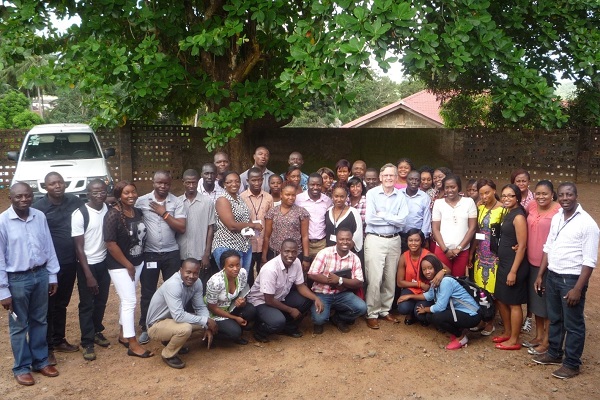
Ebola Vaccine Team, Kambia, Sierre Leone, November 2015
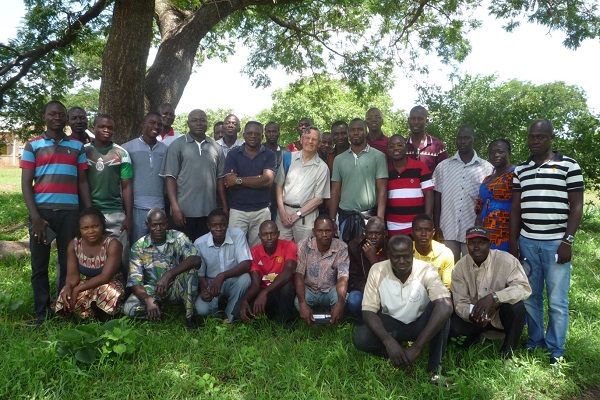
RTS,S malaria vaccine team. Hounde, Burkina Faso, October 2017
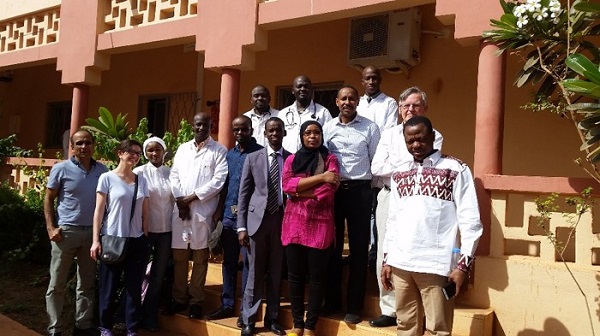
A comparative trial of seasonal vaccination with the malaria vaccine RTS,S/AS01, seasonal malaria chemoprevention and the two interventions combined. Annual meeting Bobo Dioulasso, February 2019.
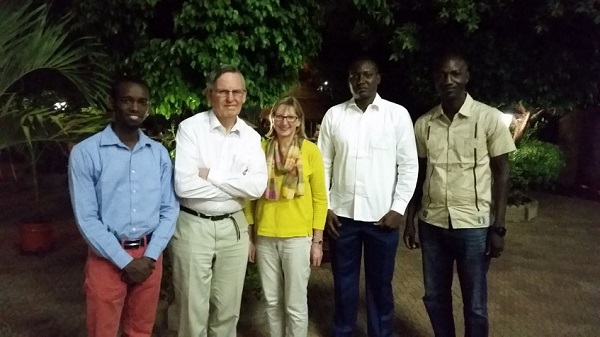
With Amadou Barry, Yves-Daniel Compaore and Eric Nebie, former ALN scholarship recipients, and Karen Slater who supports the ALN programme, Bobo Dioulasso, February 2019
